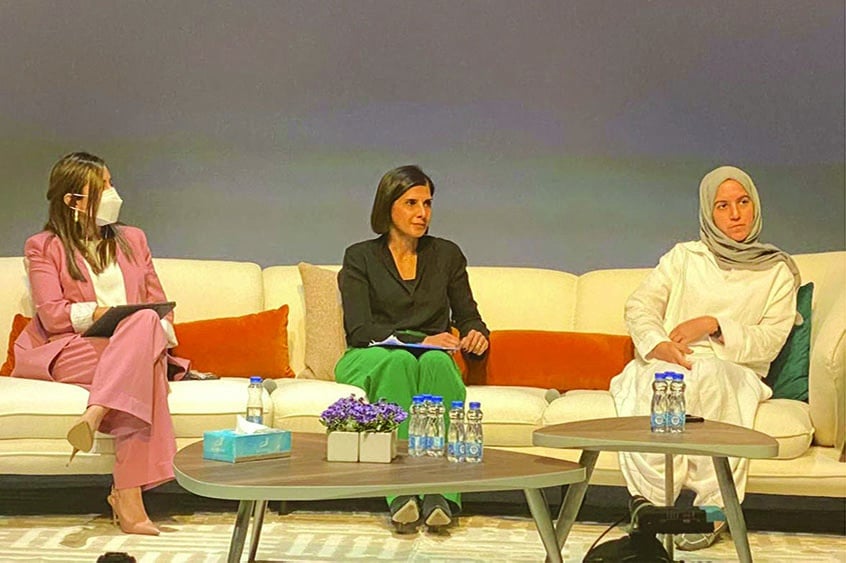By Faten Omar
KUWAIT: The focus of education in Kuwait is on the weak points of the students instead of focusing on their talents and developing them, a parenting consultant said. Speaking during a seminar on the future of education in Kuwait, the educator revealed that she and other parents are trying to persuade the ministry of education to make homeschooling an approved option for parents.
Parenting consultant Duaa Al-Edrees made those remarks while participating in a seminar held Saturday at the Sheikh Abdullah Al-Salem Cultural Centre. The session, titled 'children's education, future and upbringing', took place as part of the Kuwaiti Women's Week that highlighted Kuwaiti women's roles in various fields.
Edrees said social media helped her to communicate with parents during the coronavirus pandemic. "Social media helped to reach parents and speak with them about how to deal with children during the e-learning period and how to fill the gap that schools did not achieve," she said. Edrees is a mother of two who is committed to spreading awareness of good parenting on social media. She is an avid reader who is passionate about topics related to parenting, the environment, natural foods and maintaining a healthy domestic life.
During the event, she noted that academically, Kuwait did not stop educating students, but because of the education gap, many parents noticed the deficiency in dealing with differences between students. "Every student is a unique individual, different in learning, needs and interests. There are also other factors underlying differences between students. The focus in Kuwait is on the weak points of the students instead of focusing on what he or she is talented in and developing that. There must be an intellectual change for parents to cultivate values in children and teach them how to deal with bullying, and sympathize with the situation," Edrees said.
Edrees revealed that she and other parents are trying to persuade the ministry of education to make homeschooling an approved option for parents. "There is a defect in education. I notice creativity is getting less and less once the student registers for school, because of the traditional methods of education they use that depends only on grades. Schools in Kuwait need years of development," she added.
System flaws
Meanwhile, Ghada Khalaf, Co-founder of Education First, said after the pandemic, the education system showed its flaws, since online learning was new to Kuwait. "That is when our campaign 'Education First' started, where a group led by parents, educators and teachers worked to prioritize the educational strategy in the country and reopen schools in the aftermath of the COVID-19 pandemic," she said.
"During the pandemic, we noticed the education gap between students. Children did not have the same opportunities in education due to their learning differences. The pandemic highlighted that the education system and parents must give every student their right and distinguish between their abilities. Learning should be equal at all levels because a stumbling student has troubles dealing with e-learning," she explained.
On the other hand, Khalaf noted the pandemic allowed some students who have social anxiety to become more productive during online learning, where each student has their own personality and character. "Kuwait must accept students' diversity and allows all kinds of education. Therefore, parents and students can choose what suits them. The approval of various kinds of educational methods is the responsibility of the decision-makers and the state policy to keep pace with the developments and to be part of the fourth revolution," Khalaf pointed out.
Social interaction
Duna Al-Mashaan, Co-founder of Education First with a PhD in Educational Policy, Planning and Leadership, said: "The COVID-19 curfew affected children on the social interaction level. A study indicated there is a decrease in students' motivation to study. Children do not want to interact in the traditional way anymore. We must stop the traditional teaching methods and memorization system. The method of teaching must develop to make children have their own thinking, skills, language and communication, which will make their brains more acceptable to arithmetic, science and studies."
Mashaan pointed out that children in Kuwait have psychological and physical problems, and do not want the boring traditional methods; rather they want change, adding many types of curricula motivate the child to think, make mistakes and complete, away from the curricula of indoctrination.
"Parents must say their children prefer one form of education over the other. We are now stuck between going back to traditional methods and what changed during the coronavirus period. We must follow the child's curiosity and develop the curriculum. There must be a change even in universities, as exams cause panic and stress, not only for students, but also among parents," she said.











